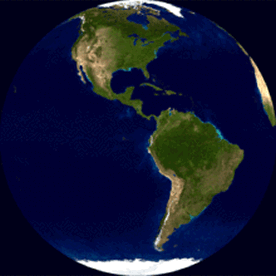Difference between revisions of "Language/Modern-greek-1453/Vocabulary/Geography"
< Language | Modern-greek-1453 | Vocabulary
Jump to navigation
Jump to search
| Line 16: | Line 16: | ||
Il existe 5 océans dans le monde | Il existe 5 océans dans le monde | ||
| | |A sea is often defined in geography as a vast expanse of salt water between two continents. | ||
An ocean (from Ancient Greek Ὠκεανός, transc. Okeanós ), is a body of water that composes much of a planet's hydrosphere. | |||
There are 5 oceans in the world. | |||
|- | |- | ||
|Ειρηνικός Ωκεανός. | |Ειρηνικός Ωκεανός. | ||
| Line 102: | Line 106: | ||
|} | |} | ||
{| class="wikitable" | {| class="wikitable" | ||
! | !Ελληνικά | ||
!Français | !Français | ||
!English | !English | ||
| Line 112: | Line 116: | ||
|Βόρεια Αμερική | |Βόρεια Αμερική | ||
|Amérique du nord | |Amérique du nord | ||
| | |North America | ||
|- | |- | ||
| Νότια Αμερική | | Νότια Αμερική | ||
|Amérique du sud | |Amérique du sud | ||
| | |South America | ||
|- | |- | ||
| Ανταρκτική | | Ανταρκτική | ||
|Antarctique | |Antarctique | ||
| | |Antarctica | ||
|- | |- | ||
| Ασία | | Ασία | ||
|Asie | |Asie | ||
| | |Asia | ||
|- | |- | ||
| Αφρική | | Αφρική | ||
| Afrique | | Afrique | ||
| | |Africa | ||
|- | |- | ||
| Ευρώπη | | Ευρώπη | ||
|Europe | |Europe | ||
| | |Europe | ||
|- | |- | ||
| Ωκεανία | | Ωκεανία | ||
|Océanie | |Océanie | ||
| | |Oceania | ||
|} | |} | ||
Revision as of 13:59, 27 February 2019
Ωκεανοί-Θάλασσες-Ήπειροι / Oceans - Seas - Continents
| Ελληνικά | Français | English |
|---|---|---|
| Οι ωκεανοί | Océans | Oceans |
| Το όνομα Ωκεανός προέρχεται από τον ομώνυμο μυθικό θεό της Ελληνικής Μυθολογίας, τον Ωκεανό.
Καθιερώθηκε, ιστορικά, από τον αρχαίο Έλληνα Ιστορικό Ηρόδοτο να χαρακτηρίζεται σήμερα παγκοσμίως με το ίδιο όνομα η πολύ μεγάλη Θαλάσσια επιφάνεια. Οι Ωκεανοί είναι πέντε. ( 5) |
Un Οcéan est souvent défini, en géographie, une vaste étendue d'eau salée comprise entre deux continents.
Le mot « océan » vient de la divinité Océan (en grec ancien Ὠκεανός / Ôkeanós), l'aîné des Titans dans la mythologie grecque. Il existe 5 océans dans le monde |
A sea is often defined in geography as a vast expanse of salt water between two continents.
An ocean (from Ancient Greek Ὠκεανός, transc. Okeanós ), is a body of water that composes much of a planet's hydrosphere. There are 5 oceans in the world. |
| Ειρηνικός Ωκεανός. | L'océan Pacifique (c'est le plus grand) | Pacific Ocean (it's the biggest) |
| Ατλαντικός Ωκεανός. | L'océan Atlantique | Atlantic Ocean |
| Ινδικός Ωκεανός. | L'océan Indien | Indian Ocean |
| Ανταρκτικός Ωκεανός. | L'océan Glacial Antarctique ( c'est le plus petit) | Antarctica - Antarctic Glaciers (it's the smallest) |
| Αρκτικός Ωκεανός. | L'océan Glacial Arctique | Arctic Ocean |
| Ελληνικά | Français | English |
|---|---|---|
| Οι θάλασσες | Le mers | Seas |
| Οι θάλασσες είναι μικρότερες και πιο ρηχές από τους ωκεανούς.
Η Νεκρά Θάλασσα περιέχει πολύ αλάτι. |
Les mers sont plus petites et moins profondes que les océans.
La mer Morte est la plus salée. |
|
| Μεσόγειος Θάλασσα | Mer Méditerranée | |
| Καραϊβική Θάλασσα | Mer des Caraïbes (ou mer des Antilles) | |
| Θάλασσα Νότιας Κίνας | Mer de Chine méridionale | |
| Βερίγγειος Θάλασσα | Mer de Béring | |
| Κόλπος του Μεξικού | Golfe du Mexique | |
| Θάλασσα Ανατολικής Κίνας | Mer de Chine orientale | |
| Κόλπος του Χάντσον | Baie d'Hudson | |
| Ιαπωνική Θάλασσα | Mer du Japon | |
| Ανταμάνεια Θάλασσα | Mer d'Andaman (ou de Birmanie) | |
| Βόρεια Θάλασσα | Mer du Nord | |
| Ερυθρά Θάλασσα | Mer Rouge | |
| Βαλτική Θάλασσα | Mer Baltique |
| Ελληνικά | Français | English |
|---|---|---|
| Οι ήπειροι | Les continents | Continents |
| Βόρεια Αμερική | Amérique du nord | North America |
| Νότια Αμερική | Amérique du sud | South America |
| Ανταρκτική | Antarctique | Antarctica |
| Ασία | Asie | Asia |
| Αφρική | Afrique | Africa |
| Ευρώπη | Europe | Europe |
| Ωκεανία | Océanie | Oceania |
